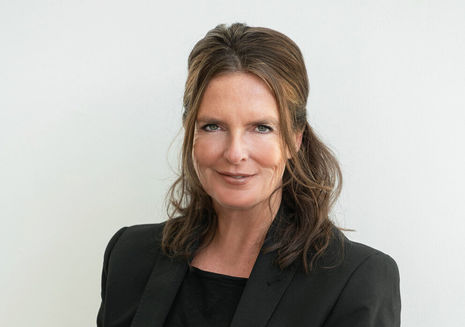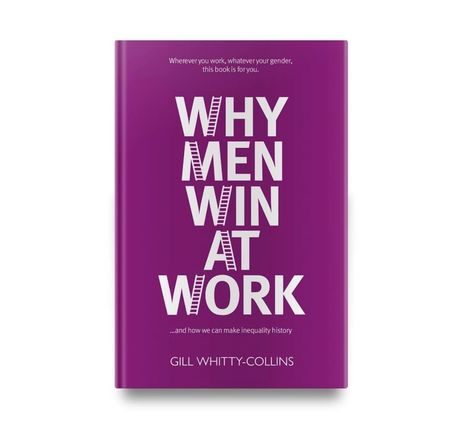“We can’t ignore this anymore”: Gill Whitty-Collins on gender inequality
Olivia Emily talks to Gill-Whitty Collins about structural gender inequality and her new book, Why Men Win at Work.

“If I could create a perfectionism vaccine and give it to all young girls, I absolutely would”, says Gill Whitty-Collins. She is in Geneva, where she’s lived since 2004, and we are chatting over Zoom.
“Women believe they’ll only be confident when they feel perfect”, she explains. “They think, ‘I’ll only be confident when I feel like I’ve got this down and I’m going to deliver it perfectly’. The problem with that is it doesn’t exist! Perfection doesn’t exist!”
When Gill graduated from Cambridge in 1992, she started working for Procter & Gamble, where she stayed for 25 years. Her final role was as one of the Vice Presidents, and it was at this level that the idea for her new book, Why Men Win at Work, was born.
“That was the first time that I’d actually really seen the gender inequality issue”, she tells me. “Obviously, I was aware of gender issues and diversity to barriers and all those things, but I’d never personally felt it before.”
“It happens in every company, every organisation, every country in the world, when you get to a certain point.”
“It’s absolutely not specific to P&G”, Gill stresses. “It happens in every company, every organisation, every country in the world, when you get to a certain point.” Globally, only 29% of managerial roles are occupied by women. In 2020, 37 women lead Fortune 500 companies (7.4%, a record high).
Suddenly face-to-face with this disparity, Gill was keen to know why it happens. “If you assume that most of the men in the world are not waking up in the morning thinking, ‘how can I damage women and put as many barriers up for them as possible?’ – which I absolutely don’t believe most men do, I think they’re doing most of this unconsciously – why does it happen?” she asks.
Why Men Win at Work attempts to answer these questions, and unpack the implicit biases that rule the workplace. Ironically, the title uses unconscious bias to its advantage: “It’s very simple marketing”, Gill tells me. “If you say ‘men’ on your book, a man is much more likely to be interested than if you say ‘women’. That had to be the title, because I want men to read it.”
With the goal of effecting real change and offering actionable solutions, Gill has a specific target audience in mind with Why Men Win at Work: men, and people who wouldn’t call themselves feminists. “There are many, many people who don’t want to be associated with feminism”, Gill tells me. “For me, there’s absolutely no reason why everyone on the planet should not happily say that they are a feminist. But it comes with a lot of baggage.”
In 2018, YouGov found that only 27% of people in Great Britain would call themselves a feminist despite 81% of people believing men and women should have equal rights. Gill says, when writing Why Men Win at Work, “It was just really important to me not to assume that everyone reading were already feminists nodding along”.
So, why do men win at work? Confidence plays a large role. “It’s really this fundamental truth that people value confidence as much – if not more – than competence”, Gill says. “As a woman, being aware of the role of confidence is really important.”
Oftentimes, in a room of confident, outspoken men, women can experience impostor syndrome, can be mansplained to, and generally feel conversationally dominated. “You know”, Gill remarks, “just because this guy is dominating the share of voice in this meeting, does not mean that this is the most impressive person in this meeting, doesn’t mean it’s the only person I should be listening to.”
Gill urges women to intervene: “If you just allow things to happen naturally without intervening, the men will show up better. And they will win. And they will get the job. They will get the promotion. You have to manually intervene and say, ‘I’m not going to let it just roll’.”
With lockdown emptying offices, workplace imbalances are going to work in new ways. Towards the beginning of the pandemic, for example, women’s academic report submissions plummeted, while men’s soared.
Gill links this to COVID exacerbating inequalities in the household. “BC, before COVID”, she says, “women were already carrying 80%+ of the unpaid work at home.” This means housework, food shopping, cooking, and childcare. A recent survey found that, in an average nuclear family, women spend 20 hours more time doing unpaid work than their male partners. During lockdown, this increased because there was more to do: more meals to prepare, more laundry, home schooling – and no outside help.
“Lockdown impacted women on a career level but it also damaged mental well-being.”
This impacted women on a career level (as there is less time in the day to dedicate to their paid work), but it also damaged mental well-being. During lockdown, LeanIn.org found 25% of women were experiencing symptoms of severe anxiety, compared to 11% of men.
“It’s an absolute disaster”, Gill says. If more attention is not paid to this issue, “companies will find themselves in a year’s time concluding that all of the men are better than the women. They’re not, they just had more time.”
But perhaps the pandemic can be a harbinger for change. “The problem, BC, was that women were doing all of this and they could just about cope”, Gill says. “They were exhausted, but they could just about do the job. But now, I think they’ve been tipped over the edge.”

LeanIn.org also found that, in the pandemic, women with full-time jobs, partners and families were more than twice as likely as men in the same situation to feel like they had more to do than they could possibly handle. “We can’t ignore this anymore”, Gill says. “This is an issue that’s always been there, but that we tolerated under the surface, and now we can’t anymore. It’s unsustainable.”
On the other side of the pandemic, as people return to the workplace, it will be up to companies to make structural changes that push towards true gender equality, and Gill works with companies to do this. “I say to companies”, she tells me, “you’ve got to gender neutralise your policies. They have to be completely gender neutral – not just in the manual, but in the way you truly execute them.”
One example is parental policies – flexible hours, child-care and maternity leave – and how they silently exclude men because, Gill explains, “Most people see them as ‘mum’ clauses. Most people, because of their unconscious bias, assume that the woman will use those policies.”
Another barrier to change is the delusion that there isn’t anything to fix. Gill likens masculinity culture in the workplace to being in a goldfish bowl: “You ask the goldfish ‘how’s the water?’ and the goldfish says, ‘What water?’”
“If you’re in a culture,” Gill explains, “you don’t even notice the culture, because it’s so comfortable for you and you can just swim around happily and not even notice.” So if the dominant workplace culture is masculine, Gill explains, women find it difficult to belong.
“Women-led countries have fared much better in the pandemic.”
However, some women are winning at work. 7% of Fortune 500 CEOs are women, after all – a tiny amount, but it’s not nothing. Woman-led countries (such as Germany, New Zealand, Taiwan, and Finland) have fared better in the pandemic than male-led countries, with one study of 194 countries finding that “being female-led [provides] countries with an advantage in the current crisis.”
“I think that’s not the point”, Gill argues. “What we’ve seen, actually, is the problem with people leading countries from confidence, rather than from competence, and having been elected that way in the first place. Because people liked their confidence, they liked their ability to communicate confidently, and they liked their charisma.”
To win at work, we need to know our strengths and deliver them with confidence, Gill states. “It takes confidence to say, ‘I know my strengths and I bring them to this place’. This place of work, this place of academia, whatever it is! I’m bringing the best of my stuff, with my full commitment and hard work. If, ultimately, that is not appreciated and valued here, that’s a real shame. But I shall take my brilliance somewhere else.”
“Awareness is the biggest gift I would give to young women.”
What message does Gill want to send to young women, today, hoping to win at work? “What I wish for young women coming behind me”, Gill says, “is awareness. Just the awareness, before it happens to you, of what is going to happen. And why.”
“Just that awareness”, she says. “That is the biggest gift I would give to young women.” And this is the gift she’s hoping to give with Why Men Win at Work. “People say to me, ‘Gill, I wish I’d read your book 20 years ago.’ And I say, ’God, I wish I’d read my book 20 years ago!’”
“I’d just be more prepared for how to handle it”, she continues. “I don’t think I could change the workplace culture. I did try. But I think I would waste less time trying to change things I can’t change. And, I probably would have moved on with my journey faster.”
Perhaps, with the knowledge Gill shares, and with the assistance of men who believe in workplace equality, the next generation of women entering their careers – us! – can make the changes Gill didn’t quite manage, and make the workplace equally welcoming to everyone.
 News / Colleges charge different rents for the same Castle Street accommodation2 March 2026
News / Colleges charge different rents for the same Castle Street accommodation2 March 2026 News / News in Brief: waterworks, wine woes, and workplace wins 1 March 2026
News / News in Brief: waterworks, wine woes, and workplace wins 1 March 2026 News / Climate activists protest for ‘ethical careers policy’1 March 2026
News / Climate activists protest for ‘ethical careers policy’1 March 2026 News / Private school teacher who lied about Cambridge degree barred from teaching27 February 2026
News / Private school teacher who lied about Cambridge degree barred from teaching27 February 2026 News / Angela Merkel among Cambridge honorary degree nominees27 February 2026
News / Angela Merkel among Cambridge honorary degree nominees27 February 2026










